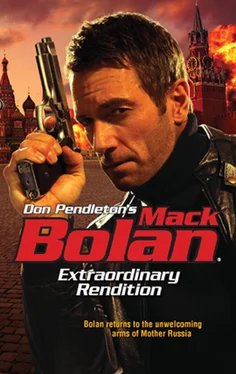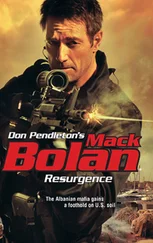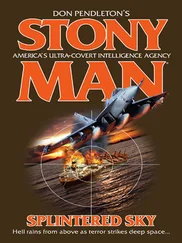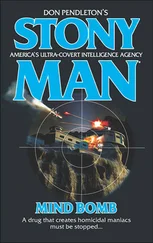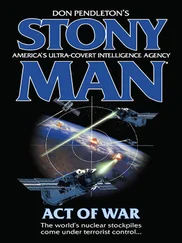“Not at all. You jumped right in and pulled your weight, no doubt about it.”
“Well, then—”
“It gets worse,” Bolan repeated. “If you come along for this ride, be prepared to go through hell. Beyond the point of no return, it’s do or die.”
“I’m ready.”
“Be damned sure.”
“I am,” Pilkin said, “damned sure.”
“Okay, then. I understand that Sokolov works closely with a General Kozlov?”
“Colonel General,” Pilkin corrected him. “One of his arms suppliers, we believe. Untouchable, politically. He’s not the only leak in Russia’s arsenal, but probably the single largest.”
“And at some point, there’s a linkup with the Mafiya?”
“Of course. Sokolov deals extensively with Leonid Bezmel. He is what you might call the ‘godfather’ of the Solntsevskaya Brotherhood, Moscow’s most powerful crime Family. His leading competition is the Obshina, the Chechen group led by Aldo Shishani. They hate each other bitterly, and so Shishani hates Gennady Sokolov.”
“Sounds like a place to start,” Bolan replied.
Kotlin Island
Some nights, when sleep deserted him, Gennady Sokolov amused himself by trying to surprise his sentries, catch them napping, as it were, although he’d never actually found one sleeping on the job. Such an infraction would have earned a penalty far worse than mere dismissal, and his soldiers knew it.
Sokolov wasn’t a man to trifle with.
He’d made that point with each of those he had disturbed that night, reminding all of them in no uncertain terms that they relied upon him for some measure of their affluence, and that their fates were linked to his. That was a risky game, since any one of them, if pushed too far, might turn against him.
But Sokolov knew people. He could read them—almost read their minds, it seemed—and use his knowledge to control them. How else had he survived four years in Russia’s army, seven in the Kremlin’s secret service, and nearly two decades of personal dealings with volatile dictators, warlords and rebels? If Sokolov wasn’t the best at what he did, he would be rotting in a jungle grave or desert trench by now.
Or worse yet, he’d just be ordinary, some pathetic drone punching a time clock, slaving for his daily borscht.
No, thank you very much.
Better to die than be deflated to the status of a peasant, groveling before the powers that be.
Sokolov took a vodka bottle and a shot glass from the wet bar in his office and retreated to his massive teakwood desk. He pressed a button on the desktop intercom but didn’t speak. Only one person in the household would answer that summons.
Less than a minute passed before Sokolov heard the rapping on his office door.
“Come!”
Sergei Efros entered, closed the door behind him and crossed the room to stand at attention before Sokolov’s desk. He didn’t move again until Sokolov ordered him to sit.
Sokolov spent a moment staring at his chief of security, framing his thoughts before speaking. Efros had spent eleven years with Spetznaz, in the “Alfa” unit, whose main duty was suppressing terrorism. He’d done time in Chechnya and was among the troops who’d stormed the House of Culture in Moscow’s Dubrovka district, during the theater siege of October 2002. As one of those cashiered to satisfy public outrage, he had left the service embittered and never thought twice about serving the Merchant of Death in return for a general’s salary.
“Still no word from Moscow,” Sokolov told him at last.
“I don’t trust the militia or FSB,” Efros replied. “Let me go there myself, sir. I’ll get the information you require within a day.”
“It’s tempting,” Sokolov admitted. “But you may be needed here.”
“As you require, sir.”
Compliance normally pleased Sokolov. This night, it irritated him. “There’s something on your mind, Sergei,” he said. “Out with it.”
“Sir, it isn’t only the police and FSB that I distrust. The Solntsevskaya Brotherhood are scum.”
“But useful scum,” Sokolov said. “Most profitable scum, as you’ll no doubt agree.”
“And then, there’s General Kozlov.”
“Ah. A personal acquaintance, is he not?”
“We never met, sir, but I had the misfortune of serving in his command, as you know.”
“The Nord-Ost siege.”
“Which he coordinated with the FSB, attempting to impress his own superiors and thus advance himself.”
“It’s the way of the world, Sergei.”
“Yes, sir. But when his plan failed—disastrously—a real man would have claimed responsibility, instead of sacrificing those who simply carried out his foolish orders.”
“You believe the Colonel General may betray us?”
“It’s a nasty habit of his,” Efros said.
“Perhaps you should go down to Moscow, after all. To keep an eye on friends and enemies alike.”
“Yes, sir.”
“Providing that you leave me in good hands, of course.”
“Of course, sir. Ivan has my every confidence. I will instruct him personally, prior to leaving.”
Ivan Fet was second in command to Efros, concerning Sokolov’s home security. He had dealt with one of the FBI snipers himself when the kidnappers came.
“In which case,” the Merchant of Death told Efros, “make me proud.”
Moscow
NO ONE AT Lubyanka Square was pleased when Maksim Chaliapin worked a night shift. His presence after normal quitting time for officers in charge meant tension, aggravation and a risk of collateral damage.
The Lubyanka was erected in 1898, as headquarters for the All-Russia Insurance Company. Following the Bolshevik Revolution, it was claimed by the Communist Party as headquarters for the new secret police—the Chrezvychaynaya Komissiya, or Extraordinary Commission, shortened to Cheka. That agency had changed names many times over the next seven decades, eventually becoming the home of the FSB.
A prison on the Lubyanka’s ground floor had witnessed the detention, torture and death of thousands. Some of its celebrated inmates included British spy Sidney Reilly, Swedish humanitarian Raoul Wallenberg, Czechoslovakian Count János Esterházy, Polish Jesuit Father Walter Ciszek, and Nobel Prize-winning author Aleksandr Solzhenitsyn.
They were among the survivors.
When Maksim Chaliapin found out who had spoiled his evening, he vowed that the persons or persons responsible would not be so lucky.
The FSB no longer had a government license to torture and kill on a whim, but there were exceptions to every rule. Its primary raison d’être was maintenance of national security, and that was clearly at risk when foreigners appeared in Moscow and involved themselves in gunplay as if they had time-traveled from the American Wild West.
Moscow suffered far too much mayhem already from home-grown thugs and mercenaries. Importation of more gunmen to make matters worse was unthinkable. Intolerable.
And it could prove costly to Chaliapin.
While his rank brought him a measure of respect—and fear—from fellow Muscovites, a civil servant’s salary in Russia allowed for few luxuries. Maksim Chaliapin, like nearly all of those around him in the present government, supplemented his normal income with gratuities from affluent citizens whom he had helped in one way or another. He resolved their problems, shifted obstacles out of their path, and they were naturally grateful.
What was wrong with that?
None of his private clients was more grateful—or more generous—than Gennady Sokolov. Of course, that gratitude and generosity depended on his satisfaction. Payment for services rendered, not for excuses delivered with failure.
Loss of such a friend, and his money, would gravely affect Chaliapin’s lifestyle. Worse yet, if Sokolov was extradited and tried, the proceedings might reveal his ties to Chaliapin. Which, in turn, could force Chaliapin’s superiors to protect themselves by sacrificing him.
Читать дальше
